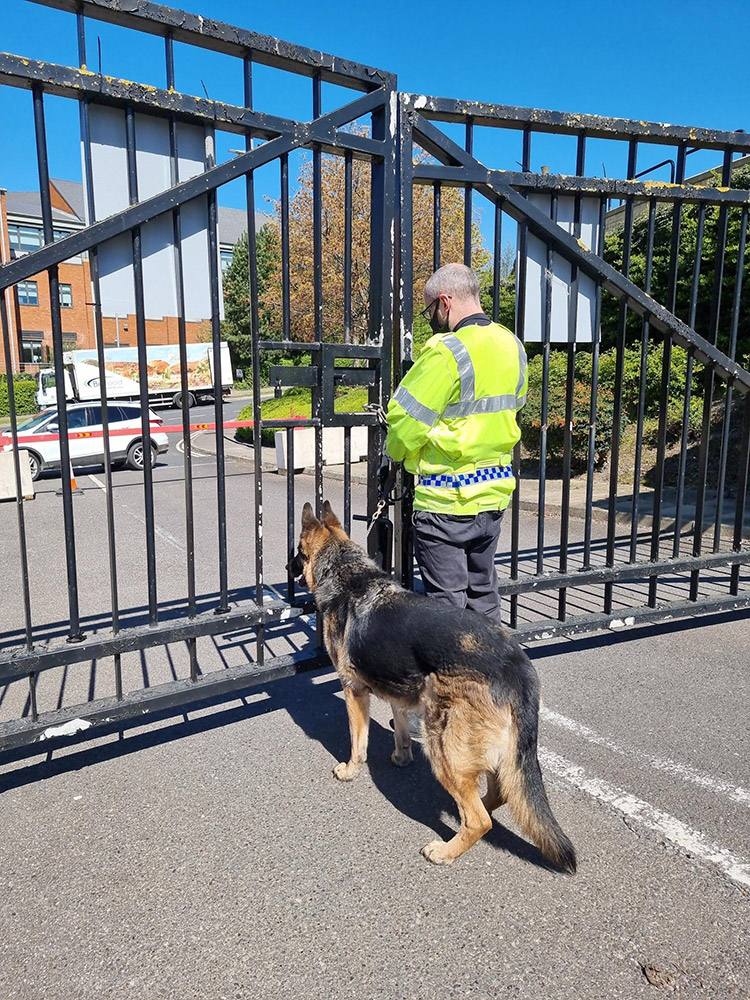When dog security is deployed, you are likely to want one or more of these three services:
- Detection – you want the dog to screen people for certain substances, such as drugs, alcohol or firearms.
- Apprehension – you want the dog to be ready and able to apprehend a burglar or any type of unauthorised person on the premises.
- Deterrent – you want the dog to be a visible presence to deter anyone in the surrounding area from carrying out a criminal act.
When should you use dog security services?
Of course the deployment of human security services are more useful where communication is required or decisions need to be made based on the circumstances discovered at an event or on a site. Also, security technology such as CCTV or access control systems may be more suitable in certain situations. But there are common scenarios where dog security is more suitable and is the ideal security solution. These are situations such as:
- You have a large site which needs to be covered quickly and effectively
- There is a high risk to security personnel and dog security acts as a deterrent
- Lots of people need to be screened very quickly, such as in a queue for an event or in a busy airport terminal
- It is too costly to deploy a proportionate number of security officers and dog security can do the job just as quickly and effectively.
What are the benefits of dog security services?
There are many advantages to using dog security which make it more effective and better value for money. These include:
- Heightened senses – a dog’s sense of smell is up to 10,000 times more sensitive than a human’s, so dogs can be trained to detect certain substances in large crowds, which makes screening much quicker and much more reliable.
- Presence – a dog can act as a visible deterrent to potential criminal activity.
- Power – dogs can be aggressive and powerful when they need to be, and dog security is trained to do this only when the situation demands it.
- Agility – dogs can be agile and fast and so can cover a large area much quicker than a human can.
- Passivity – as much as you want dog security to be aggressive when needed, they can also be trained to be passive and just a visual presence at other times. This is useful at events where dog security is merely a deterrent and is only needed to react in certain circumstances.
- Confidence – the confidence of a dog handler is elevated by working with a trained dog so they can deal with more risky or complex situations.
- Loyalty – dogs are loyal and consistent and therefore will never lack motivation, so you can rely on their performance levels.
- Obedience – dogs will follow strict instructions perfectly.
What accreditation and training should dog security have?
There is no governing body for the training of dog security but it is widely accepted that dog security should follow the code of practice BS 8517, which dictates how security dogs should be trained and looked after. The safety and welfare of security dogs is an essential element of their training. It is important that handlers can look after their dogs in terms of food and water, the right training for different scenarios and suitable transportation that meets the needs of the dog.
Any security professional in the UK should be SIA-licenced and of course that also applies to a dog handler. Furthermore, a dog and its handler are licenced as a pair, and hence a handler is only licenced to work with the specific dog they have trained with. Most providers of dog security will be registered as members of NASDU, the national association of security dog users.
In addition to the above, a good dog security provider will be comprehensively insured and covered for public liability insurance. In terms of providing a professional service they should also be able to carry out a full risk assessment of your site before discussing what level of security is needed. This will help to ensure the resulting dog security that is deployed is sufficient and effective. It is also possible to fit dog handlers with GPS trackers so that it is always possible to locate where the dog security is on any particular site. This is another essential feature of a good dog security provider.
What types of dog security services are there?
Common types of dog security services include:
- Vacant property dog security – where commercial premises are left vacant for an extended length of time they become an invitation to theft, trespass, nuisance and arson. Dog security patrols act as a visible deterrent and can apprehend unauthorised visitors.
- Construction site security – construction sites pose significant risks because they are left overnight with excavations or part-completed constructions that are not always able to be fully guarded. Also, a site’s layout and risk levels can change every day so it is very hard to fully implement safety procedures consistently. Dog security patrols are able to monitor construction sites to ensure safety overnight.
- Dog security for site evictions – dog security is ideal for carrying out site evictions because the handler can deal with communications while the dog can both deter and apprehend as necessary.
- Dogs for event security – dogs can be a passive or visible deterrent as necessary for the type of event you are holding, and can quickly and effectively screen for substances in large crowds. Dogs are also trained to be calm and to be able to handle large crowds.
- Temporary dog security – because dogs are fast, consistent and reliable they can be very quickly deployed and be reactive to emergency or temporary situations.



